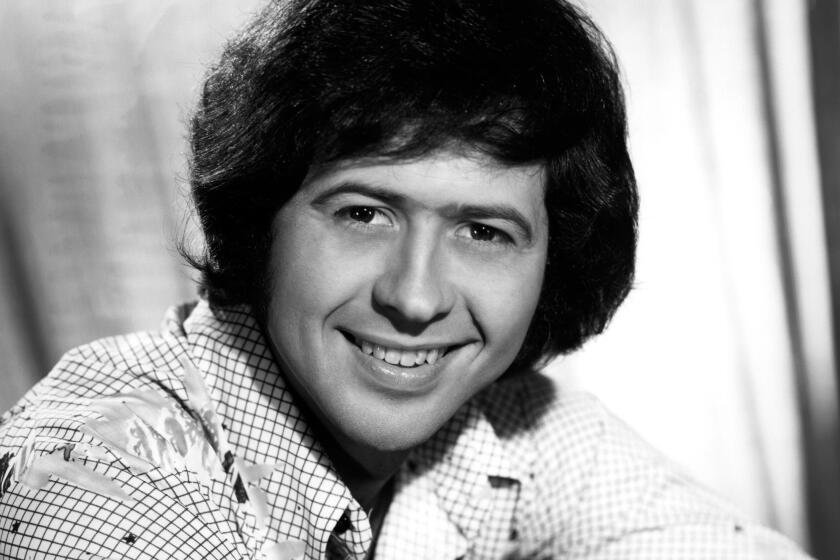Not Jealous or Jaded
- Share via
Lock up your daughters. The Gin Blossoms are on tour, and they’ve added a new weapon to their arsenal of rock ‘n’ roll debauchery.
“The newest thing I bought is a chess clock, so we’re playing some speed chess now,” singer Robin Wilson says. “It is kind of mellow on our bus,” he adds, conceding the obvious.
Welcome to the new middle of the road--a stretch of rock highway that skirts the rough terrain of punk, alternative and rap while avoiding the banality of mainstream commercial product.
The Tempe, Ariz.-based Gin Blossoms practically wrote the book on the style--at least in its ‘90s manifestation.
Steeped in the ‘80s American indie-rock tradition of guitar aggression and melancholy introspection, the Gin Blossoms and such kindred groups as Soul Asylum blend folk-rock jangle with rock riffs, and high, winsome vocals with lyrics detailing uncertainty and regret. Evoking both traditional roots and classic radio-pop economy, it’s heartland rock with a clear view of suburbia.
It’s a strain that has existed on rock’s fringes for years, but the Gin Blossoms brought it to mainstream radio and the pop charts in 1993, when “Hey Jealousy” and “Found Out About You” both became staples of Top 40 radio. “Until I Fall Away” and “Allison Road” were also Top 40 hits, and the album “New Miserable Experience” sold 2 million copies.
The band’s new album, “Congratulations I’m Sorry,” has sold fewer than 250,000 copies since its release in February, but with “Follow You Down,” the band is in the Top 10 of the national singles chart. Typically, the record (paired with “Till I Hear It From You,” last year’s hit from the “Empire Records” soundtrack) is a presence on a wide range of radio formats--Top 40, rock, active rock, adult contemporary, alternative and adult alternative.
So Wilson isn’t being entirely sarcastic when he calls the band “a hit machine.”
“We’re not one of those groups that thinks hits are for losers,” the 30-year-old singer says.
“All our heroes were groups like the Plimsouls and Replacements that didn’t sell records--so it is a little unnerving. But I don’t feel guilty for having sold more records than the Replacements. I just wish to hell that they had been able to sell this many records. It’s just not always fair.
“But then again, maybe the Replacements didn’t play the game as well as we do. In addition to being good musicians and decent songwriters, we’re actually willing to play this game.”
*
Wilson is playing a good game over coffee in the bar of a West Hollywood hotel, the band’s headquarters on a day it is set to play a private show for radio, press and record company personnel on the A&M; Records sound stage.
Breezy, confident and earnest, Wilson is part idealistic music fanatic and part smooth entrepreneur--the low-key, image-free quintet’s glad-handing emissary to the outside world.
“I just kind of exploded into my role,” he says, sitting at a low table. “Right from the moment I became the frontman, I kind of felt like the emcee, the host of the whole thing. I’m somewhat terrible at remembering names sometimes, but beyond that I think I’m pretty good at all this--the interviews and all the other nonsense.
“It doesn’t seem like it makes any sense to fight it. We realize that if we’re gonna have hits, we have to do all this other stuff. It’s an easy trade for the freedom that we have in our lives.”
The Gin Blossoms coalesced from friendships formed at a Tower Records store in Tempe, where Wilson and Bill Leen, the Blossoms’ bassist, worked. The band started playing in late 1987, and the first solid lineup gradually took shape: Wilson, guitarists Jesse Valenzuela and Doug Hopkins, Leen and drummer Phillip Rhodes.
The band soon conquered the clubs in the Tempe-Phoenix area and then started up the ladder: a self-financed album, “Dusted,” in 1989; performances at the South by Southwest showcase in Austin, Texas, and at the College Music Journal Awards in New York; a deal with the music licensing organization ASCAP that led to regular showcases at the Coconut Teaszer nightclub in Hollywood.
The Blossoms were signed by A&M; in 1990 and released an EP, “Up and Crumbling,” in 1991 and an album, “New Miserable Experience,” in 1992. The band toured hard and the album sold in the modest 80,000 range, and it looked as if that would be it, until a year after its release.
“Then the label and our manager got together and decided it was a much better record than that, and they came up with a strategy to relaunch the record with a new cover and a new video,” Wilson says. “It was basically just a matter of the label deciding that they wanted to make it a hit--’OK, we’re really gonna do it this time.’ ”
To David Anderle, senior vice president of artists and repertoire at A&M; Records, the group’s success is a clear mandate from an audience seeking refuge from alternative rock’s aggression and edge.
“Not all the young kids belong to that style of music or are represented by the angst of that message,” he says. “There are other kids who see life a little bit simpler. . . . It’s not kids who don’t see a future. The Gin Blossoms are a little more uplifting, and I think they strike a chord with those kids.”
Their music may avoid extremes, but the Gin Blossoms have weathered one test that few bands will face: the alcohol-fueled disintegration of founding member Hopkins, who was fired by the band during the recording of “Experience” and committed suicide in December 1993.
“Doug liked the idea of being the Charles Bukowski of Tempe,” Wilson says with a smile, recalling not just a bandmate but also a close friend who would engage Wilson in impassioned record-listening discussions and debates.
Wilson speaks with an easy fondness of Hopkins now, but there wasn’t much affection in the air during the recording of “New Miserable Experience” and in its aftermath, when Hopkins grew increasingly bitter over his former partners’ growing success.
Says Wilson: “It’s just a sad thing when you’ve got somebody you love, [and] you’re just watching them destroy themselves before your eyes and there’s nothing you can do to stop it. And it’s all happening while you’re making the most important record you’ve ever made in your life.”
Wilson and his bandmates (including Hopkins’ replacement, Scott Johnson) realize that the Gin Blossoms wouldn’t have gone anywhere without Hopkins’ contributions. Indeed, half the songs on “New Miserable Experience” were Hopkins’ songs, and two of them--”Hey Jealousy” and “Found Out About You”--became the band’s signature hits.
Still, they didn’t lack confidence when they convened to record the new album.
“We knew that we could write songs,” says Wilson, citing the two successful singles he wrote on “Experience” and last year’s hit, “Till I Hear It From You.” “We weren’t worried about that. It’s not our responsibility to live up to Doug’s songwriting.”
It might be tempting to attribute the bittersweet mood that permeates the Gin Blossoms’ music to the Hopkins legacy, but in Wilson’s view that’s only partially true.
“I think it’s just good lyrics,” he says. “We’re not really disenchanted, disgruntled, unhappy people. Doug was, and that definitely came through in his songwriting, and I think at times I try to capture the spirit of what he did. But in general I think we write like that just because we know it makes a good song.”
Wilson formulated his standards when he discarded his new-wave skinny tie and rediscovered bands that combined traditional American rock with a pop sensibility--and, more important, had something to say to him.
“When I really started to concentrate and focus my own songwriting style while listening to Tom Petty and Cheap Trick and the Replacements, I think it was because they were singing about real things,” Wilson says. “They weren’t singing about the antichrist and nuclear war and these kinds of things. They were singing about real stuff that I could directly relate to.
“It’s just pop music. I want to touch some people on some fundamental level, in the same way that I’ve been touched when I hear a pop song that I really love. But my idea of a really great pop song is something like ‘A Million Miles Away’ or ‘Surrender,’ ” he says, citing classic power-pop tracks by the Plimsouls and Cheap Trick, respectively.
“These songs, they’re not gonna save any whales or any rain forests, but they’re great songs that make you feel good, and I’d like to do that.”
*
Hear Gin Blossoms
* To hear excerpts from the group’s album “Congratulations I’m Sorry,” call TimesLine at 808-8463 and press *5728.
In the 805 area code, call (818) 808-8463.
More to Read
The biggest entertainment stories
Get our big stories about Hollywood, film, television, music, arts, culture and more right in your inbox as soon as they publish.
You may occasionally receive promotional content from the Los Angeles Times.








